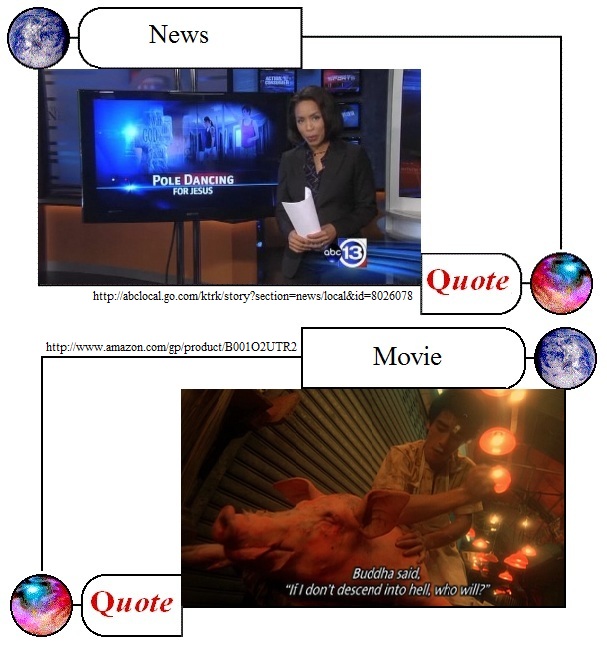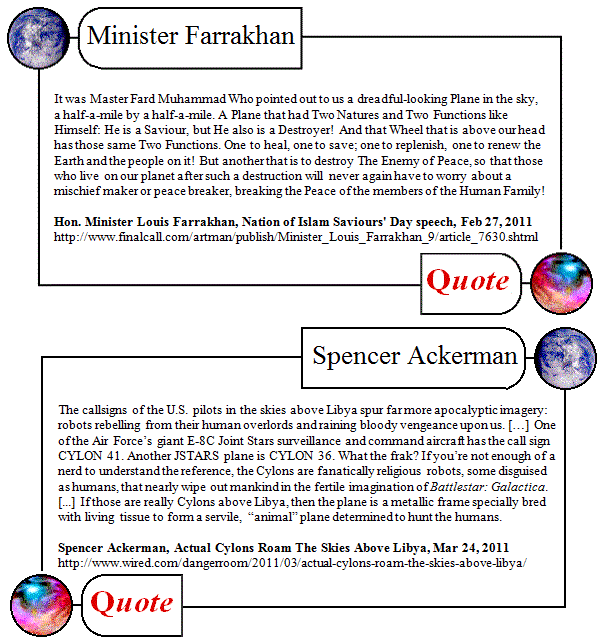Of war and miracle: the poetics, spirituality and narratives of jihad
Wednesday, March 30th, 2011[ by Charles Cameron ]
*
Issue #5 of the AQAP magazine Inspire is now available for viewing.
I am reasonably confident that with attention focused on such things as al-Awlaki‘s response to the various uprisings across the middle east, the delightful computer graphic (a throw back to the era of green print on black screens) which shows Ben Ali and Mubarak “booted” and Gadhafi and Saleh “in progress” – and the translation of a chunk of Abu Musab as-Suri on “Individual Terrorism Jihad and the Global Islamic Resistance Units” – a lot of eyes will glaze over during the course of reading “My Life In Fallujah” (pp. 56 ff).
The piece sounds promising – something to read about Fallujah from the enemy viewpoint for after action / lessons learned purposes… but then it gets into miracles:
The brothers received extraordinary miracles from Allah as a sign to strengthen them and these miracles were in all different forms. It got to the point where some of the things that occurred might not have been believable to the brothers had they not seen them with their own eyes but that is the grace of Allah which He bestows on whom He wills.
… and my bet is that snoring ensues…
Though not among the readers to whom it is pitched.
.
One:
What if we don’t regard the piece as a mirror for our own knowledge of events in Fallujah, but as an opening into the enemy’s grand narrative and – gasp – spirituality?
The piece continues:
Now let me relate some of the stories of fighting with the enemy and the miracles some of the brothers received. I will start mentioning some of these great miracles
There was a brother named Abu az-Zubair as-Sana’ani. He was killed at the beginning days of the battle. We used to go out in the daytime to engage with the enemy. Hardship and severe exhaustion were afflicting us due to the hot weather that was in the beginning of Ramadan.
So that brother came at the time of afternoon and sought permission from the Amir to break his fast. Some brothers advised him to have patience and suggested to him that he could have a shower and then rest for a while. The brother went inside to sleep out of fatigue and we were sitting in front of that house. The brother didn’t sleep long and we saw him coming out towards us with a cheerful face saying to us that he had seen a dream while he was asleep. The brothers asked him what was it; he told them that he saw a very beautiful woman coming to him, carrying a plate full of all kinds of fruits. She was waking him up, standing by his head and telling him: O Abu az-Zubair, don’t break your fast. You are invited to break your fast with us today. The brother then said that he felt comfort and relief. There was a brother called Abu Tariq who interpreted dreams so he told him that by Allah’s will, it will be something good. After that the brother decided to continue fasting.
We had a timetable for twelve people to cook food and that day was his turn. He went to the kitchen and we stayed outside, sitting next to the wall of that house so that we weren’t seen by the spy planes. We stayed there until it was about time to break fast. Suddenly an F-16
jet showed up in the horizon and targeted that kitchen with a missile where that brother was! A while after when the dust had settled, we went in the kitchen and saw that brother had been martyred. It was amazing how the smell of musk was all over the room, how the smile was on his face!Thereupon the brothers’ moral was raised and they were making takbir. These were from the unforgettable moments.
It seems wise to compare this with the Miracle of Uthmaan recounted by Abdullah Azzam on p. 27 of his book, The signs of Ar-Rahmaan in the Jihad of Afghanistan — indeed, I’m surprised Inspire didn’t make the connection:
One morning Uthmaan (ra) said: Last night I saw Rasulullah sallAllaahu alayhi wa sallam in my dream, and he said: Oh Uthmaan, break your fast with us. He was martyred that same day, whilst in the state of fasting.
If one considers such stories not as “superstitious” or examples of “magical thinking” – one easy way to discount them – nor as “diabolic” and emblematic of a “false religion” – another – if, in fact, one reads them with some empathy for their content as faith-narratives, they are profoundly moving, and will no doubt be so to many of their intended readers.
This particular narrative – an earthly fast broken in heaven – could well be a motif in the Aarne-Thompson classification system for folkloric motifs.
Note also the reliance on dreams and dream interpretation – a reliance which also figures prominently in the transcript of bin Laden‘s discussion of 9/11.
.
Two:
Another miracle was the incident of Abu Abd ar-Rahman at-Turki who was a student of knowledge that memorized the Qur’an and the six books of hadith. He was amongst a group that went out to confront a breakthrough of the enemy. While the brothers were gathered to organize a defensive plan, this brother made takbir and rushed towards the enemy. Some brothers called him back but he didn’t pay attention to their words. He shouted back to them saying “I am seeing the hoor! I am seeing the hoor!” When this brother reached the enemy’s area, he was shot by a tank shell leaving his lower body completely severed. Some brothers managed to drag him out of there to a safe house which I was in. Even though the brother was between consciousness and unconsciousness, he was still advising brothers to fear Allah and to keep firm upon the truth. His lower half was ripped out, yet he was still reassuring the brothers and would always raise his vision upwards telling them that he is seeing the hoor coming, and that they should keep firm because this is the path of jannah. At hearing that, the brothers’ spirits were high and they felt relieved. Abu Abd ar-Rahman declared the shahada and then kept fainting until his soul departed his body. At that point we smelled the musk coming out of him and saw peace on his face. This smell of musk from the mujahidin would be something that was smelt regularly.
This “smell of musk” too (also found in the story of Abu az-Zubair above) is a regular feature of martyrdom tales, and features in the same work by Azzam, for instance in this report:
Moulana Arsalaan narrated to me:A student named Abdul Baseer attained shahaadat while with us. It was very dark. Fathullah, another mujaahid, and I went in search of his body. He said to me: “Is the Shaheed close. I perceive a fragrant scent”. I picked up the scent, and we reached the body by following the scent. In the darkness, I could see a noor (light) in the blood, which was gushing forth from his wound.
Indeed, as I have pointed out before, this motif has a parallel in the Catholic tradition of the “odor of sanctity” – “the perfume-like scent given forth by the bodies of saints during their lifetime or after death … symbols of the fragrance of extraordinary virtue” [as defined in Fr. John Hardon’s Modern Catholic Dictionary].
It appears in the Arthurian legends, too, as Malory describes the death of Sir Lancelot – notice here, too, the motif of the joyous dream:
And so after midnight, against day, the Bishop [that] then was hermit, as he lay in his bed asleep, he fell upon a great laughter. And therewith all the fellowship awoke, and came to the Bishop, and asked him what he ailed. Ah Jesu mercy, said the Bishop, why did ye awake me? I was never in all my life so merry and so well at ease. Wherefore? said Sir Bors. Truly said the Bishop, here was Sir Launcelot with me with mo angels than ever I saw men in one day. And I saw the angels heave up Sir Launcelot unto heaven, and the gates of heaven opened against him. It is but dretching of swevens, said Sir Bors, for I doubt not Sir Launcelot aileth nothing but good. It may well be, said the Bishop; go ye to his bed, and then shall ye prove the sooth. So when Sir Bors and his fellows came to his bed they found him stark dead, and he lay as he had smiled, and the sweetest savour about him that ever they felt.
.
Three:
There was a brother named Abu Dujanah at-Taifi. As soon as he entered Fallujah at the beginning of the battle, he asked the brothers to let him go to the front lines but the brothers told him that he had to learn shooting first. He replied, “By Allah! I won’t be anywhere except the front lines.” His brother was present there so they agreed to his request and allowed him to go there.Thereupon he said: ”By Allah! If the Americans come forward, then Allah will see from us that which He loves.” He then went to stay inside a trench to keep an eye on the front lines.On the second day when he saw the enemy breaking through, he jumped out and got ready to strike them with an RPG but before he could fire it, he was struck by a tank, and as a result, his body was torn apart. His body stayed there for six days before we were able to retrieve it.
To our surprise, blood was still coming out of his body even though the weather was so hot that if you were to place a piece of meat outside for half a day, it would eventually get rotten.
His blood was seeping as if he was just killed and his index finger was in the position of tashahud [that section of Muslim prayer where the index finger is raised while reciting the shahada or confession of faith]. His brother was a little bit sad at hearing the news but once he saw his body, he felt so much comfort.
E Cobham Brewer’s Dictionary of Miracles: Imitative, Realistic, and Dogmatic looks to be a terrific source for the kind of research I’m doing here – that’s the “Brewer” of Brewer’s Dictionary of phrase and fable – and p 372 of the 1894 edition has a section on “Bodies of Saints Incorruptible” prefaced by a quotation from Psalm 16.10: “Thou wilt not suffer Thy Holy One to see corruption”.
His body preserved, his finger raised in the gesture of salat … powerful.
.
Four:
Another incident that has to be mentioned is when the Americans were breaking-through from the direction of the Shuhada district. The brothers in that area were few in numbers so they were attacked fiercely and their lines were nearly broken but all praise be to Allah, it started drizzling all of a sudden, and then the brothers were strengthened and encouraged. The enemy was fleeing so we did not know whether they fled because of the brothers fighting or because they saw something else. The enemy acted as though they had been frightened by something. The brothers only numbered six. The enemy was massive as they were accompanied by tank corps and armoured vehicles but their withdrawal was bizarre. At that time we remembered the verse of the Qur’an where Allah says:
And sent down upon you from the sky, rain by which to purify you and remove from you the evil [suggestions] of Shaytan and to make steadfast your hearts and plant firmly thereby your feet [8: 11].
Once again, the motif of merciful rain should not be unfamiliar to us – if not from the New Testament‘s “He makes His sun rise on the evil and on the good, and sends rain on the just and on the unjust” then at least from Shakespeare‘s “The quality of mercy is not strain’d, / It droppeth as the gentle rain from heaven / Upon the place beneath…”
.
Five:
How many references to literary analysis, or archetypal analysis for that matter, can you find in Heuer‘s classic Psychology of Intelligence Analysis?







